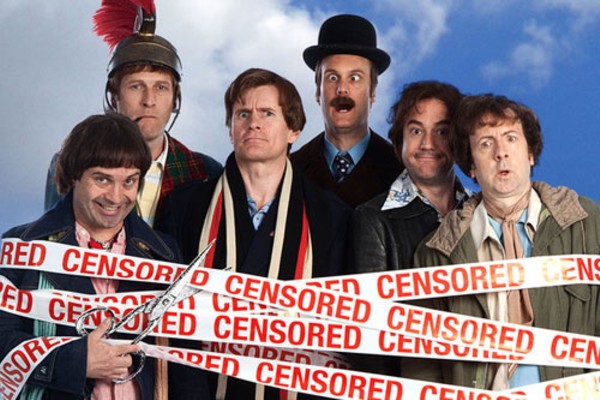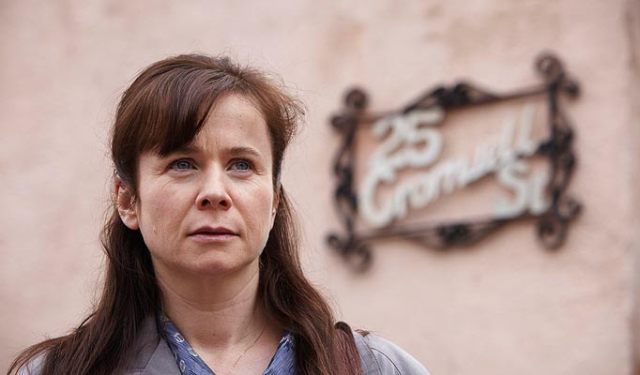This was actually an an unwanted DVD review for something or other and I can see why it wasn’t wanted. I disliked the series so much that I found it hard to summon up the energy to either savage it or laugh at it. Instead I was merely bored by it. I produce it here on the blog just in case anyone should ever be tempted to watch it!
I’d been looking forward to watching Mr Pye ever since it was drawn to my attention a short while ago. The combination of Derek Jacobi, the fact that it was an adaptation of a Mervyn Peake novel, contained an offbeat plot about a man growing angel’s wings and the fact that it was shot entirely on location on the Channel Island of Sark seemed to suggest that it had a lot going for it. Add to that the fact that its director, Michael Darlow, although less associated with drama, had made his name at the helm of impressive documentaries notching up episodes of series such as The World at War and, most famously, Johnny Cash in San Quentin and it looked like a winner. However, if anything can ever have been said to be less than the sum of its parts it’s Mr Pye.
Adapted by Landseer Productions for Channel 4 and shown back in 1986, it is very much a product of its time in a number of regards. Like many 1980s productions shot on film it looks rather faded in colour and this Network release doesn’t appear to have accessed the original film prints for a new transfer and grade which it sorely needs to inject some sense of vibrancy rather than the slightly washed out look we are served up here. Ironically, while the picture quality now looks decidedly cheap and grotty it would have been an expensive production at the time when many dramas were still shot as a mixture of film and video.
One benefit though to having been made when it was is that it got made at all. The days when genre pieces were being produced were rapidly drawing to a close, with science-fiction and supernatural dramas being consigned briefly to history before being revived in more recent times. It’s hard to imagine a four-part miniseries being commissioned much later than this when the television landscape of Britain had somewhat turned against dramas like this which engage in both fantasy and whimsy.
However, it is very much of its time and it would be difficult to see how a piece as slow and aimless as this is could be commissioned at all in the drama landscape of today, let alone do well. Its problems begin almost immediately and the production serves us up a first episode which is entirely at odds with the remaining three but which could have been so easily avoided by a better screenwriter, script editor or director to ensure that there was some reason for the viewer to tune in again the following week.
As the first episode begins we are introduced to the rather fuddy-duddy, clappy-happy Mr Pye arriving by ferry to the island, apparently to bring “love” to its inhabitants and being met by the landlady at whose house he will be staying. He aims to bring the islanders closer to “the Great Pal” – his term for God – and although it’s slightly quirky to hear this term the first few times it does begin to grate somewhat by about the five thousandth instance in Episode Four. For the remainder of the opening episode he potters about being chatty to people and greeting them pleasantly, singing jolly songs and carrying out the occasional minor good deed on the level of fence painting.
And this is where it all gets a bit difficult to understand where the production team and screenwriter’s heads where at. I’m guessing that this series was probably marketed as being one about a man who grew angel’s wings through doing good deeds – it’s right there on the front of the DVD cover for modern audiences and I’d imagine any pre-publicity at the time would have drawn attention to it. Any modern production… actually, scrap that. Any sensible production of any age would surely have the big reveal of the first signs of his wings starting to poke through the flesh on his shoulders as a cliffhanger at the end of the first episode, acting as a major hook to the audience to tune in again. However, in Mr Pye the episode ends halfway through his attempts to stage a beach party and winch an old woman to the proceedings. In other words, we’ve endured an episode of mildly whimsical antics from a dottery old busy body with absolutely no indication at all that the series is indeed something else entirely. Why tune in again? If you didn’t already know about the twist in advance you would have absolutely no reason to as it had been fairly aimless stuff up to that point. When the reveal comes it’s about ten minutes into the second episode. It’s almost as if they didn’t break the script into episodes and just shot pages and pages of script and then, when they got into the edit, they just said, “Oh, that’s fifty minutes. Just stop there”. “But it’s halfway through a scene and doesn’t make much sense”. “Doesn’t matter – that’ll do”.
Given that we’re led to believe that the sudden sprout of wings from his shoulders is due to Mr Pye’s good deeds the viewer is also left scratching his or her head as to why, given that one of his supposedly good deeds was winching an old woman in a homemade device over the edge of a cliff, despite her protests and screams, leaving her terrified and bed-ridden after the event and hating him forever. What must the rest of the islanders be like if this is considered to be a good deed? In fact, we actually see him taking a horse whip to the same old woman in an earlier scene to encourage her to get out of a horse-drawn carriage!
 Of course, the real meat of the story is in the conflict in Mr Pye’s mind caused by his wing growth and his attempts to undo his good deeds, which results in him growing a pair of devil’s horns. Some of his acts of wanton naughtiness do bring a chuckle, such as gleefully kicking over a sandcastle belonging to some children on the beach, but they are a rare relief in what is a very wordy script full of soliloquies and very un-natural performances. This is never more the case than when Mr Pye takes his wing condition to Harley Street and embarks upon a pantomime routine with a doctor in which he somehow manages to avoid just showing the wings, convincing the doctor he is mad before rather predictably being dragged away by two men in white coats.
Of course, the real meat of the story is in the conflict in Mr Pye’s mind caused by his wing growth and his attempts to undo his good deeds, which results in him growing a pair of devil’s horns. Some of his acts of wanton naughtiness do bring a chuckle, such as gleefully kicking over a sandcastle belonging to some children on the beach, but they are a rare relief in what is a very wordy script full of soliloquies and very un-natural performances. This is never more the case than when Mr Pye takes his wing condition to Harley Street and embarks upon a pantomime routine with a doctor in which he somehow manages to avoid just showing the wings, convincing the doctor he is mad before rather predictably being dragged away by two men in white coats.
For all its faults throughout the early episodes you do feel a certain sympathy towards the unfortunate Pye who is eternally caught between growing wings and growing horns, unable to find any balance that will leave him with neither, so it’s perhaps the biggest failing of all that the series ends with such a damp squib of a final episode, dreadfully padded out even before a never-ending chase scene is added before concluding with probably one of the most disappointing endings I’ve ever seen committed to the screen.
Whimsy certainly has its place, and I’m not averse to its charms, but there’s little else on offer from Mr Pye. Jacobi does his best with the script but it’s a poor screenplay, meandering aimlessly around for at least an episode too long before ending inexplicably. The location filming is fair but it doesn’t really sing in the way that it should and Sark doesn’t shine as another uncredited lead in the way you know it would today, or if someone with a more cinematic eye for beauty had directed. Instead it seems a bit listless. And, sadly, the whole thing seems a little lazy as well, as if the unusual element of the story was considered enough of a draw with other considerations such as characterisation deemed surplus to requirement.
As expected though, Jacobi emerges from it all with distinction, a solid performance pretty much always guaranteed from him, and he has a lot to do in it given the over reliance on the character of Pye and of him often talking to himself. He’s ably abetted by Judith Parfitt, another reliable character actor familiar to fans of British television, as Mrs Dredger, but their relationship is one that suffers in the writing. Dredger dislikes Pye when he first arrives but by the halfway point of the first episode she leaps enthusiastically, with no prior warning, into his camp of good deeds. The two of them adapt names for each other and while some may find them calling each other “Chief” and “sailor” constantly and repeatedly for the remainder of the series charming others may find it twee to the point of inducing vomit. Sadly, there’s little else in the way of characters in the series. There are only two others who appear throughout all the episodes and one of those, the artist Thorpe, is nothing more than a cipher, leaving the wild and promiscuous figure of Tandy as the only character who develops much and who seems in any way real.
Slowly paced, badly structured, lacking in characters at all, let alone those which are believable or who develop, and directed in a pedestrian manner Mr Pye is a four hour disappointment. Perhaps its appeal might be to those who have read the book, which it apparently is quite faithful to, and if you have enjoyed the former then I daresay you might also appreciate the small screen adaptation. Sadly, when the series ends up being less interesting than the very welcome DVD extra of a contemporary “Making of” documentary by Channel TV for Channel 4 (bizarrely placed on the first of the two discs and therefore riddled with spoilers) then you know you’ve got a failed production on your hands.
























